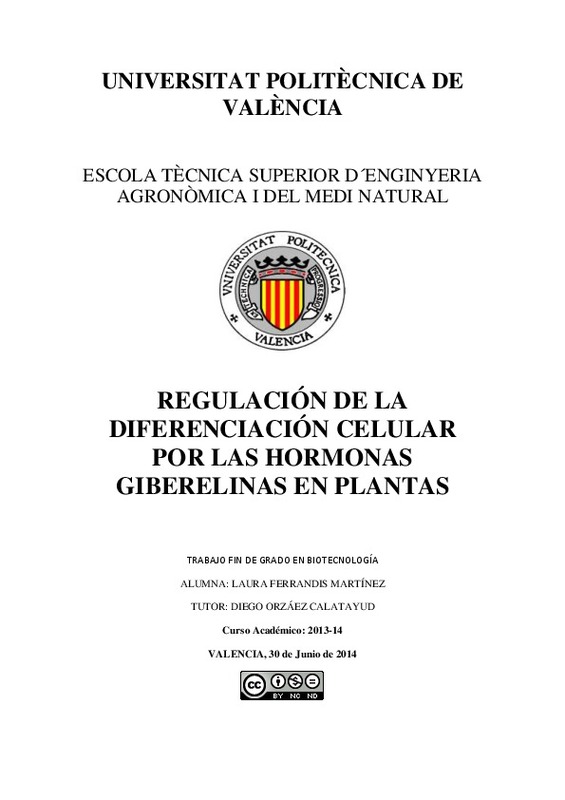JavaScript is disabled for your browser. Some features of this site may not work without it.
Buscar en RiuNet
Listar
Mi cuenta
Estadísticas
Ayuda RiuNet
Admin. UPV
Regulación de la diferenciación celular por las hormonas giberelinas en plantas
Mostrar el registro sencillo del ítem
Ficheros en el ítem
| dc.contributor.advisor | Orzáez Calatayud, Diego Vicente
|
es_ES |
| dc.contributor.author | Ferrandis Martínez, Laura
|
es_ES |
| dc.date.accessioned | 2014-09-19T14:12:28Z | |
| dc.date.available | 2014-09-19T14:12:28Z | |
| dc.date.created | 2014-06-29 | |
| dc.date.issued | 2014-09-19T14:12:28Z | |
| dc.identifier.uri | http://hdl.handle.net/10251/39789 | |
| dc.description.abstract | [ES] El desarrollo de las plantas es en su mayoría post-embrionario. Tras la germinación, los nuevos órganos se originan en dos zonas localizadas en los polos opuestos de la planta y que se denominan meristemos apicales, del tallo (SAM) y de la raíz (RAM). Los meristemos contienen las células madre, que se mantienen continuamente en un estado indiferenciado. La identidad de las células en el SAM se mantiene gracias a la actividad de los factores de transcripción (FTs) KNOTTED1-LIKE HOMEOBOX (KNOX). Por el contrario, la actividad KNOX está reprimida en los flancos de SAM donde se originan los nuevos órganos – hojas o inflorescencias- gracias a la actividad de otros FTs, los TEOSINTE BRANCHED1/CYCLOIDEA/PCF (TCPs) y ASYMMETRIC LEAVES1 (AS1), que promueven diferenciación celular. La hormona giberelina (GA) también juega un papel importante promoviendo diferenciación celular aunque no se conoce el mecanismo por el que ejerce este control. Se ha descubierto que las proteínas DELLA, que son los reguladores negativos de la señalización por GAs y son degradadas en respuesta a la hormona, son capaces de interaccionar físicamente con los TCPs en Arabidopsis thaliana. En este trabajo se prueba la hipótesis de que las GAs inducen diferenciación en la zona apical del tallo promoviendo la actividad de los TCPs. Para ello se ha estudiado cómo se ve influenciada la expresión génica de AS1, una diana directa de los TCPs, mediante ensayo histoquímico GUS realizado en fondos mutantes capaces de expresar GUS allí donde se expresa AS1 y mutantes con ganancia de función de los TCPs. Por otra parte, la realización de ensayos de cuantificación de RNA mensajeros mediante la técnica de qRT-PCR en fondos silvestres y mutantes con la señalización por GAs alterada, puso de manifiesto que las DELLAs no ejercen una regulación transcripcional sobre los genes TCPs. | es_ES |
| dc.description.abstract | [EN] The development of plants is mainly post-embryonic. After germination, new organs are originated in two opposite regions of the plant and they are called the shoot (SAM) and the root (RAM) apical meristems. These meristematic areas contain stem cells that are continuously in an undifferentiated state. The identity of the cells in the SAM is maintained by the activity of transcription factors (TFs) knotted1-LIKE homeobox (KNOX). By contrast, KNOX activity is repressed in the SAM flanks where new organs -leaves or inflorescences- are developed. This is because other TFs, the teosinte BRANCHED1/CYCLOIDEA/PCF (TCPs) and ASYMMETRIC LEAVES1 (AS1) promote cell differentiation. The plant hormone gibberellin (GA) also plays an important role in promoting cell differentiation. However, the mechanism by which exercise this control is not known. It has been discovered that DELLA proteins, which are negative regulators of signaling by GAs and are degraded in response to the hormone, are capable of physically interact with TCPs in Arabidopsis thaliana. Here, we test the hypothesis that GAs induce differentiation in the shoot apical region by promoting activity of TCPs. For this reason, we have studied the expression of AS1, which is a direct target of TCPs, by histochemical GUS assay performed in mutant backgrounds which express GUS where AS1 does and mutants with gain of function of TCPs. Furthermore, RNA quantification assays by qRT-PCR technique were done in wild and mutant GAs altered signaling backgrounds. These studies revealed that DELLAs do not work as transcriptional regulators of TCP genes. | es_ES |
| dc.format.extent | 30 | es_ES |
| dc.language | Español | es_ES |
| dc.publisher | Universitat Politècnica de València | es_ES |
| dc.rights | Reconocimiento - No comercial - Sin obra derivada (by-nc-nd) | es_ES |
| dc.subject | AS1 | es_ES |
| dc.subject | TCP | es_ES |
| dc.subject | DELLA | es_ES |
| dc.subject | GA | es_ES |
| dc.subject | cellular differentiation | es_ES |
| dc.subject | KNOX | es_ES |
| dc.subject | SAM | es_ES |
| dc.subject | Diferenciación celular | es_ES |
| dc.subject.classification | BIOQUIMICA Y BIOLOGIA MOLECULAR | es_ES |
| dc.subject.other | Grado en Biotecnología-Grau en Biotecnologia | es_ES |
| dc.title | Regulación de la diferenciación celular por las hormonas giberelinas en plantas | es_ES |
| dc.type | Proyecto/Trabajo fin de carrera/grado | es_ES |
| dc.rights.accessRights | Abierto | es_ES |
| dc.contributor.affiliation | Universitat Politècnica de València. Escuela Técnica Superior del Medio Rural y Enología - Escola Tècnica Superior del Medi Rural i Enologia | es_ES |
| dc.description.bibliographicCitation | Ferrandis Martínez, L. (2014). Regulación de la diferenciación celular por las hormonas giberelinas en plantas. http://hdl.handle.net/10251/39789. | es_ES |
| dc.description.accrualMethod | Archivo delegado | es_ES |
Este ítem aparece en la(s) siguiente(s) colección(ones)
-
ETSIAMN - Trabajos académicos [3541]
Escuela Técnica Superior de Ingeniería Agronómica y del Medio Natural






